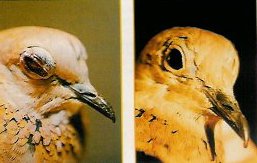|
WILD BIRD RESCUE

Far left: A Laughing Dove (Stigmatopelia senegalensis) showing eye injury after collision with a window.
Left: The same dove after receiving treatment and recovering.
This injury is frequently encountered by the general public. Windows, particularly large picture windows, often act as mirrors. They reflect the garden, appearing to birds as a continuation of the space in which they are flying, with often-tragic results! Try to obscure large areas of glass to make them invisible to birds.
DO NOT release a ‘crash victim’ within minutes or even hours of picking it up. Simply because it can fly doesn’t mean it is perfectly alright. Birds are past masters at concealing their injuries. They have to be, or every predator would be on them within minutes.
Possible, initially invisible to the naked eye, injuries as a result of a collision could be:
- Concussion.
- Blindness or swollen eyes.
- Severe damage to the chest or crop.
- Damaged airsacks.
- Broken bones or damaged beak.
- Severe bruising, which could later effect the bird's ability to fly.
EMERGENCY FIRST AID TREATMENT
- Make a cold compress by placing crushed ice and frozen peas in a small plastic bag. Apply to the effected area, usually the head, for up to one hour, taking care not to chill the bird overall and especially not wet it.
- Administer emergency oral electrolytes (see Animal Talk February 1999 issue for details).
- If the bird’s eyes are affected, see that they don’t dry out. Keep them moist and help them by applying ‘Isee’ (available from your vet) or a similar eye ointment (not cortisone).
- Place the bird in a dark box (see Animal Talk February 1999 issue for details).
- GET HELP. Your vet or local rehabilitation centre will probably administer cortisone and a broad-spectrum antibiotic.
By Gordon M Duncan and Wings in Need
Animal Talk March 1999
< Back
|













